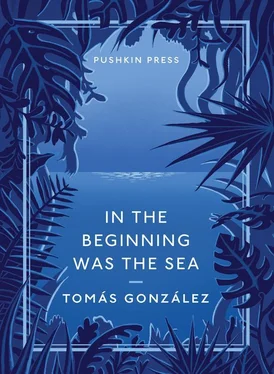Before he left, Gilberto promised to help as much as he could.
By ten o’clock, the moon had risen over the sea and was glistening over the forest, silhouetting the house from behind and casting a silvery shadow over the meadow in front of the house. The moonlight glittered on the spray of the phosphorescent waves as they crashed on the beach. J. knew that tonight he would have to fire Octavio. He could hear the man in the kitchen talking to his wife. But since the old man went to bed late — he slept little, less than five hours — J. postponed the difficult conversation for as long as possible. He saw the lights of a passing shrimp boat out on the open sea. He heard the muffled rumble of the engine. He saw Kaiser walking along the beach, heading for the village, and watched until he melted into the shadows of the forest. J. had already drained half the bottle of aguardiente and the more he drank the more desperate his need to be rid of Octavio and his wife. He felt trapped by them, as though tangled in a mass of seaweed dragging him down into the murky sands of a world he did not recognize at all. Anger welled in him. A small, jet-black cloud covered the moon for an instant and the shades of night were plunged into the sea. Then the cloud scudded on and the darkness was made light once more. From the village came the sound of dogs yapping.
Talking to Octavio was not easy; he liked to remain aloof and aguardiente did little to mellow him. Between sips, vast silences extended like murky lakes. Stripped to the waist, the old man was sitting in a chair leaning back against one of the pillars, his back to the sea. The paraffin lamp cast a dim glow on his chest, matted with grey hair, and glistened on the scar snaking across his belly. J. had once asked about the scar and the old man had told him it was from an operation on his liver. “The old bastard has his liver where his stomach should be,” J. thought but did not enquire further. Now, unwillingly, his eyes were drawn to the gleaming weal. Suddenly, realizing he was afraid to fire the old man, J. felt a surge of anger: he needed to act quickly, to settle the matter once and for all.
“I’m selling the finca , Octavio,” he said brusquely. “I need you and your family to move out within the next three days because I have to leave.”
He took a long swig of aguardiente as the words hung in the air, echoing like a church bell. For a moment, the old man said nothing. He looked dumbfounded.
“You are not going to sell the finca ,” he said finally.
J. stared down at the bare boards of the veranda, feeling his face flush with rage.
“Whether or not I sell is my business,” he said slowly. “One way or another I need you out of here by Wednesday.”
“This is what always happens with rich fuckers like you: you bleed a man dry and then toss him on the scrapheap.”
“I’m not rich, I’m not throwing anyone on the scrapheap, and I have not bled anyone dry.”
“You know how hard I’ve worked.”
“That’s enough,” roared J. “The finca is mine and I don’t have to justify myself to anyone.”
“There’s no need to humiliate me.”
“I’m not humiliating anyone! I’m sick to the back teeth of you and your pig of a wife and your children. I don’t want to have to deal with shit all over the veranda, and I don’t want to have to listen to those fucking brats squalling.”
Octavio turned pale, got to his feet and challenged J. to a fight. The situation was absurd. J. was thinking that the old man had spent all day working in the forest and probably stank of sweat. The idea of him and the old man wrestling on the ground was insane. J. became very calm. He felt no fear now.
“I am not about to fight anyone, Octavio. You’re a much stronger man than I am, you could do me serious damage. Now go and pack your things. If I see you here tomorrow morning, I’ll get the police and have you thrown off my land.”
“You’re a pitiful excuse for a man.”
“Don’t talk such shit,” J. said almost affectionately. “I think it might be better if you went to bed.”
J. stared out at the luminous waves crashing on the beach. He felt the aguardiente , cold and harsh, trickle down his throat. He listened as the waves retreated in a soft clatter of shingle. Octavio, he sensed, had gone back into the house. He had just started to urinate when he heard the first shot, felt the bullet hit him, and collapsed. He was bewildered. He felt a tingling in his right arm. Looking down, he saw his shirt was soaked with blood. “Dear God!” he said. He tried to get up but his right arm was too weak and he slumped back onto the grass. He put his weight on his left arm and managed to struggle to his feet. He felt sick. Just as he was about to run, he heard the second barrel and collapsed again onto the meadow.
“Dear God,” he said, “I’m dying.”
He lay motionless for a moment, staring at the blades of grass.
He turned his head and saw Octavio standing on the veranda, holding the still-smoking rifle.
“That’ll teach you to humiliate poor people.”
“Octavio, I need a doctor.”
But the old man had already disappeared. He locked his family in their room and set off for the village to announce he had killed J.
“Octavio, get a doctor.”
There was a sibilant hiss now as he breathed. In the locked bedroom Octavio’s wife and children were crying. Branches brushed against the old man’s face as he raced along the dirt track like a lunatic, aiming the shotgun at the darkness.
“A doctor,” J. groaned.
He no longer tried to get up. He knew he would not be able. He gazed at the shimmering waves as they broke, listened to the whispered drone of the fishing boat out at sea.
“Oh, God!”
Salomón arrived and told him the best fishing would come with winter. When J. opened his eyes Salomón was gone and still the waves shimmered as they broke. He called again for a doctor. He closed his eyes, and heard Salomón telling him the best fishing would come with the rainy season.
It was the last human voice he would hear.
By the time the tide ebbed in a soft clatter of shingle, he could no longer hear it.
Octavio returned, followed by several shadowy figures — none of them dared come close — and walked over to where he lay, now motionless and deathly pale. Octavio gathered him up as one might a sleeping child, climbed the steps to the veranda, walked as far as the bedroom and laid him out on the bed. Then he set off on the road to town.
He was going to turn himself in.
TWO DAYS LATER, Guillermo was the first member of the family to arrive at the finca . He found J. laid out on a table, his body bloated and purple. Seeing him, Guillermo felt his testicles draw up. Doña Rosita, who had washed the body and kept vigil for two nights, told Gilberto to get him a shot of aguardiente . Guillermo drank it and slumped into a chair, his face in his hands, and began to cry.
“We need to bury him now,” he said when he had calmed down. “We can’t just leave him rotting.”
“Don Eduardo has already embalmed him,” said Gilberto. “He should hold out until tomorrow. Is the coffin on its way?”
Guillermo did not know. He had let the rest of the family know, but it had been decided that sending a coffin all the way from Medellín would take too long. As for Guillermo, he had not had enough money to bring one from Turbo.
The following day one of the brothers arrived. He did not view the body. His face ashen, his eyes dry, he asked the police to make an inventory of the few things that had not been stolen, then he personally stored them in one of the bedrooms, which he padlocked. He said that bringing a coffin from Turbo was a ridiculous idea; besides there was no time.
Читать дальше










